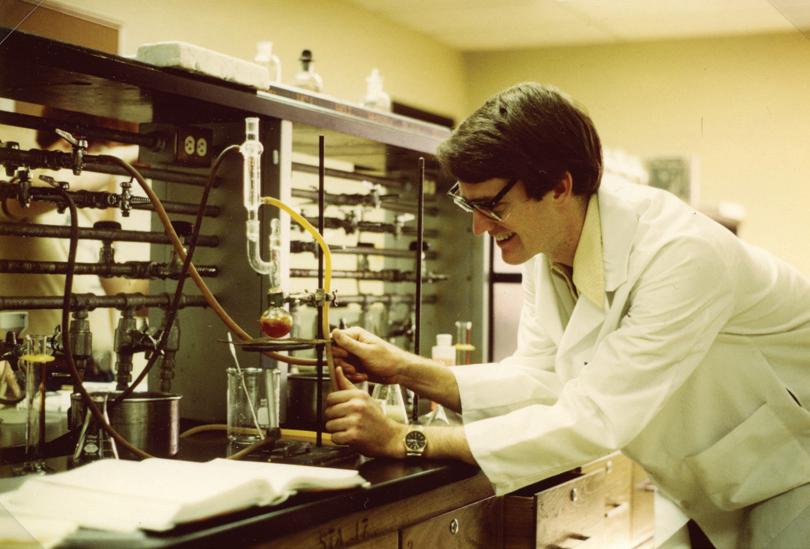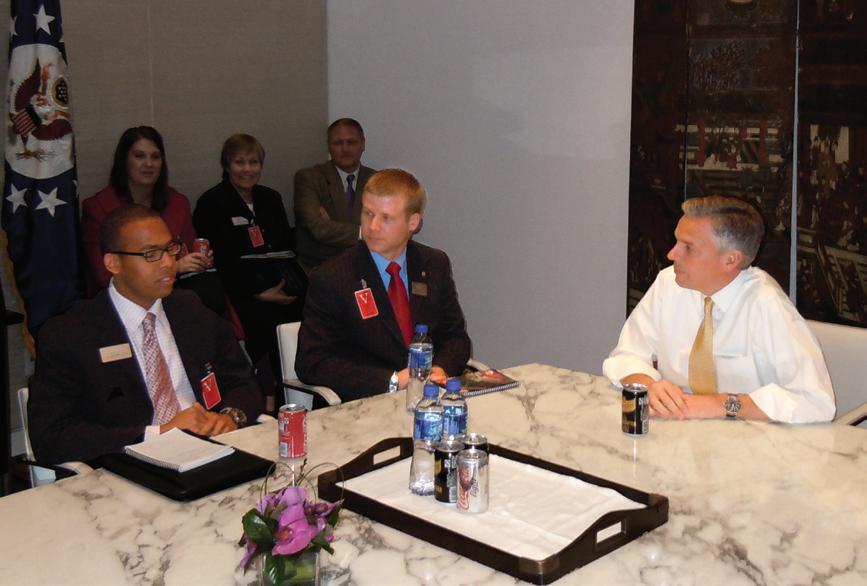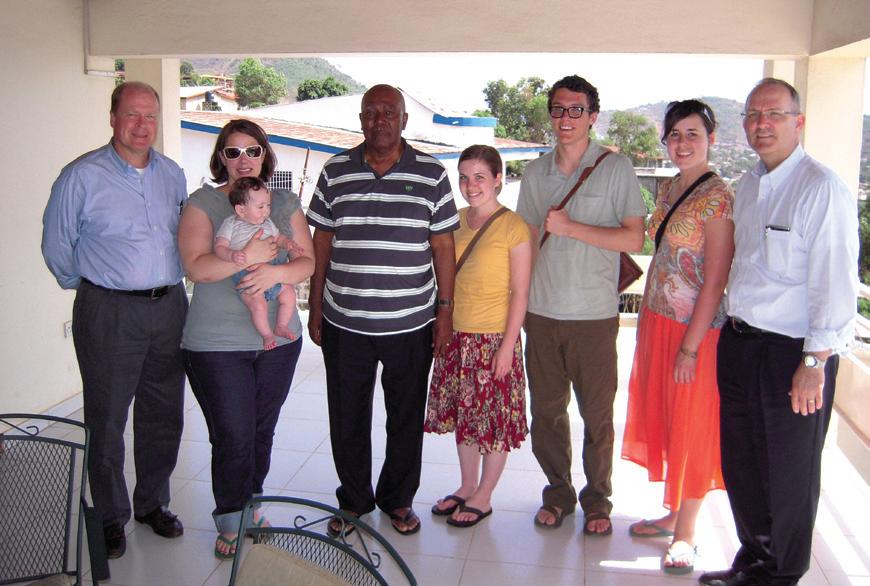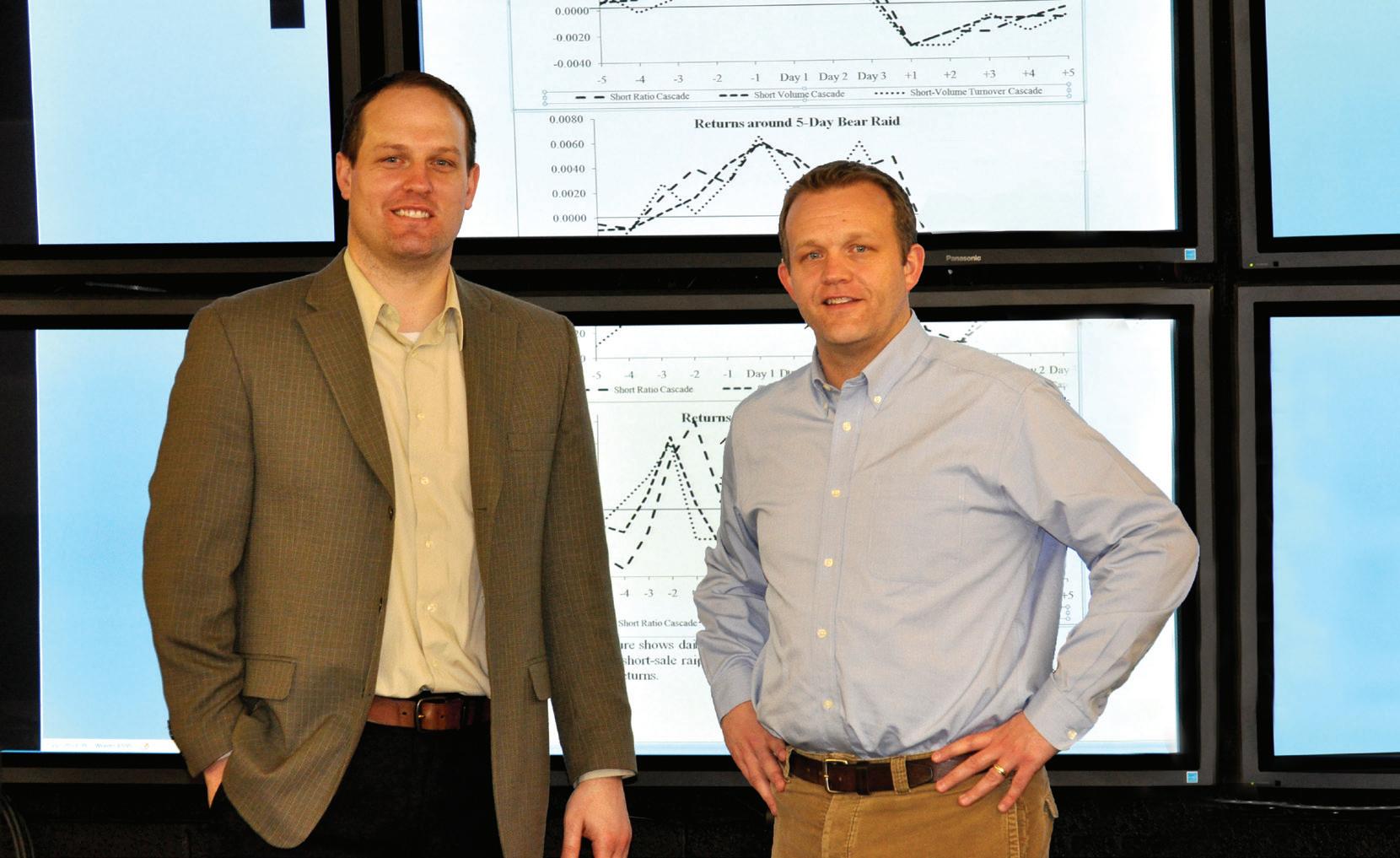
10 minute read
THE MURRAY LEGACY
The Murrays, clockwise from top: Bob, Chance and Pepper.

continues into its fourth USU generation
BY CHANCE MURRAY
Legacies are woven into our lives. We are surrounded by them. They exist in sports, politics, education and business. They live and they breathe, and, just as we do, they grow old and they die. Legacies are being forged and forgotten each and every day.
My family’s story began decades ago when my great grandfather, David Parker Murray, enrolled in what was then the Utah State Agricultural College. David worked for endless months as a sheep herder in Cache Valley to earn enough money to fund his education. In 1916, David’s tenacity and hard work were rewarded when he earned his college degree and graduated.
Due to heart complications, David became unable to work, and his wife, Mabel, and four sons were charged with providing for the family. My grandfather, Bob Murray, recalls: “Life was tough. We woke up before the crack of dawn to fight the canyon wind and deliver newspapers as we were assigned.”
Bob survived the biting wind and eventually enrolled at Utah State as well. His education was filled with activities on and off campus: skiing at Beaver Mountain, participating in the Blue Key Honor Society and starting the “lighting of the A” tradition with his fraternity, among other notable experiences. Bob graduated with a degree in Finance in the spring of 1951.

He also received the Cotter Key Award, continued success. Now, in presented to distinguished military addition to seeing patients, graduates, which led to a regular com- Pepper serves on the National mission in the Air Force and flights Advisory Board for the Jon M. around the world. Huntsman School of Business.
Bob’s Cache Valley upbringing As the fourth person in this became a great strength for him at Murray legacy, I am occasionally Harvard Business School, where he overwhelmed by the accomplishearned his graduate degree, and ments of those before me. Each genlater when he started numerous eration has blazed a trail to provide business ventures throughout the more opportunities to those who Intermountain West. Bob has follow, and the charge has been passed remained a loyal Aggie throughout the to each subsequent generation to reach years and continues to give back to the new heights and explore new ideas. university. Two decades after Bob’s graduation, Pepper Murray discovers his My experience at Utah State has been filled with powerful and cuttingthe family tradition continued when his love for biology. He serves edge opportunities. Educational proson Pepper Murray, arrived on campus. on the Huntsman School’s grams have introduced me to industries After working for Bob throughout his youth, Pepper came to Utah State and National Advisory Board. throughout South America and Europe. Dean’s Convocations and other events found a love for biology, a path that would have placed world ideas at my fingertips eventually lead him to Harvard Medical through leaders such as Jon Huntsman, School. He spent many of his days in the science lab and in the Stephen Covey, Ezekiel Gatkuoth, Mark James, Jim Quigley library, but academics were not his only priority. Among his and Roger Martin. These experiences have brought not only fondest memories were cheering for Leo Cunningham and the new perspectives, but time-proven principles upon which sucUSU basketball team, winning the cow-chip-throwing contest cessful careers have been built. during Ag Week, flying kites on the HPER Field at midnight As graduation nears, I often pause in retrospect, pensive and becoming a True Aggie with the love of his life on the “A” about the legacy I am leaving behind. Once again, a Murray block next to Old Main. He graduated in 1982 and moved to will come and go. The future, with all its uncertainty, lies beBoston to begin medical school. fore me. But, with generations at my side, I am determined to
Business principles served Pepper well as he began his seize the opportunities that surface. medical practice in 1991. Marketing, customer relations, profit Now, will this legacy be limited to four generations? and loss, overhead and capital investment quickly became part Don’t count on it. With the caliber of education and quality of his essential vocabulary. With a simple business understand- of opportunities that are available to students here, you can ing and some additional assistance from Bob, the practice bet there will always be a Murray on campus. As for me, I’m wobbled to its feet. stepping out of the classroom and into the corporate world to
Although trained for medical surgery, Pepper became continue paving the way for those to come. versed in business strategy, something that has led to


People who are not in sync with Utah State University’s academic calendar are often surprised to discover an empty campus during spring break. A natural question may be,
WHERE IN THE “ WORLD
ARE ALL THE STUDENTS?”
BY STEVE EATON
That would have been a tough question to an- ing in Sierra Leone with Chis Fawson, senior assoswer at the Jon M. Huntsman School of Business ciate dean, Dave Herrmann, executive in residence; during the last spring break. Nearly 90 Huntsman and Ann Norman, associate director of marketing. students were scattered across the globe as they While there, former Sierra Leone President traveled to China, England, France, Italy, Japan, Tejan Kabbah invited them to his home. Some have the Republic of Sierra Leone, Spain and the United compared President Kabbah to Abraham Lincoln Arab Emirates. because President Kabbah kept Sierra Leone to-
A group of 13 MBA students and four gether during a brutal civil war. The visit was set up alumni traveled to China, where they met with by Ms. Norman, who co-wrote, along with Joe Alie, United States Ambassador Jon Huntsman. Kathy an autobiography of President Kabbah. McConkie, assistant director of the MBA program, “He brought peace to the collapsed nation that said she was impressed with the personal attention many thought impossible to attain,” Ms. Norman Ambassador Huntsman gave each of the students. said. “He is a great and gentle man and a humani-
“He went around the table and had all the stu- tarian. He literally saved a nation.” dents introduce themselves, tell him their names, Dr. Fawson found the visit to be a highlight. where they were from and what they wanted to “The experience of meeting with President do,” Ms. McConkie said. “He was engaging and Kabbah was truly extraordinary,” Dr. Fawson said. remembered their names. He made a connection “To be in the presence of somebody who’s considwith each of the students.” ered a global statesman and to see his humility−
MBA student John Tall agreed. there was no presumption in his demeanor.”
“Discussing the ChineseAmerican relationship with “One of the best forms of education, frankly, is travel, because Ambassador Huntsman was an amazing experience,” Mr. Tall you’re able to gain that much broader perspective from your own said. “He pulled us into his parochial views, but also you’re able to understand your own office and put a personal touch culture better as you put it in context with another country.” on the visit. It is apparent that he loves his job and has been a — Brad Winn great ambassador for the United States.” In addition to visiting foreign leaders, the
Students traveling in Japan were in Kyoto when students also traveled with embedded executives. the earthquake hit. Joseph Banks, internship coor- “I think our programs are unique in a lot of dinator, said they didn’t realize at first how serious ways,” Dr. Fawson said. “One of the ways we have the earthquake had been because the epicenter done this is by embedding executives in these was so far away. travel programs. As students are traveling, they
“We felt a little bit of shaking, but it took me have access to seasoned executives who have a 10 seconds to realize that the shaking was from an deep insight into how the world really works.” earthquake,” Mr. Banks said. In China, the president of Toyota Motor
Meanwhile, in Africa, five students were travel- Technical Research and Service Co. Ltd, Ritsuo


Above left: MBA students meet with Ambassador Jon Huntsman Jr. at the U.S. Embassy in Beijing. Above right: Students and faculty meet with former President Kabbah at his home in Freetown, Sierra Leone. Opposite: Gabriela Garcia with the Huntsman Scholar Program in Switzerland. Tokyo Dubai Toyohashi Manchester Bureh Town Paris Florence Isle of Anglesey Magburaka Barcelona London Bracknell Taiama Leatherhead Milan Bo City Beijing Kyoto Freetown Rome Hong Kong Guangzhou Moyamba Xi’an
— Leah Gunther Shingo, rode the bus with the students and shared his business wisdom in a very personal way.
“The most memorable quote from the entire trip for me came from Mr. Shingo,” Ms. McConkie said. “When we asked him what he thinks makes a good leader, he said, ‘You get a lot of problems thrown at you when you’re a leader. When a problem comes up, the most important thing to do is go out and see what is happening. Seeing is understanding.’”
Each group was given special treatment and extraordinary access at the companies and facilities visited. Ken Snyder, executive dean and chief administrative officer, led the Japan visit.
The MBA group who visited Manchester, London and Wales in the United Kingdom was given a four-hour tour of a nuclear power plant. They later discovered the facility was similar to the one in the Japan earthquake. Tour manager and faculty representative, Ron Godfrey, was able to lead a in-depth discussion on the facility and operations management in such a crisis.
The students said the visits opened their minds to some of the opportunities available to them.
Leah Gunther was one of 12 students who went to Spain and France on a Master of Science in Human Resources Executive Program (MSHR) trip. She said business people have to understand the international marketplace. “Even if a company does not offer its products and services internationally, it cannot escape the global aspect,” she said. “They will interact with international customers and employees in their own country, deal with international suppliers or have to expand their own markets internationally. Understanding international business is crucial.”
Brad Winn, director of the MSHR Executive Program, took a group of MSHR students to Paris and then on to Dubai. The group was the first from the executive program, which draws its students from working professionals throughout the state of Utah.
“One of the best forms of education, frankly, is travel; because you’re able to gain a much broader perspective from your own parochial views, but also you’re able to understand your own culture better as you put it in context with another country,” he said.
Dr. Fawson summarized the international experience by explaining, “This really immerses students into a full sensory experience where they see business, they touch business, they experience the culture — all of those things create a much more powerful learning experience than just talking about it in a typical classroom setting,”
Our students understand the significance of these experiences to transform their lives.
“One of the four pillars of the Jon M. Huntsman School of Business is global vision,” Ms. Gunther said. “Utah State University is not simply professing it — they are living up to their standards. They are taking their students all around the world, touring businesses and interacting with professionals in a global setting to prepare their students to be successful business leaders internationally.”
For a longer version of this story, go to huntsman.usu.edu/alumnispring2011










